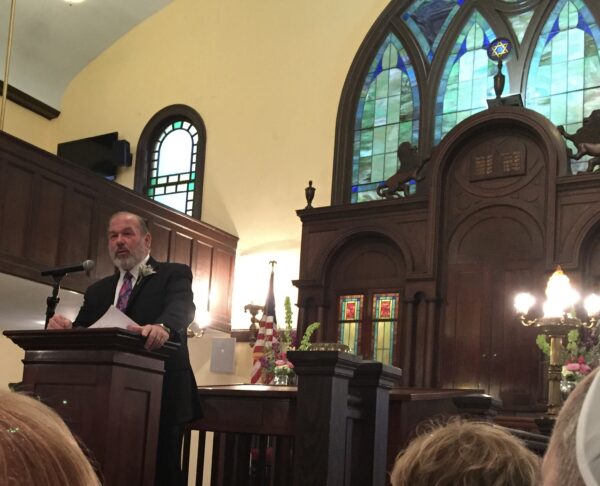
Several synagogues and places of worship in Portland can be traced to the 1880s. Shaarey Tphiloh was the first building that was erected specifically as a synagogue in 1904. Etz Chaim Synagogue came into being because of a dispute that started in 1915 between Rabbi Chaim Shohet and the board of directors of Shaarey Tphiloh Synagogue over the dismissal of Cantor Lebovitz. Rabbi Shohet’s support of Cantor Lebovitz culminated in the Rabbi’s dismissal in 1917. According to popular legend, the Rabbi’s chair was removed from the sanctuary and placed in the bathroom. As a result of these events, some members of Shaarey Tphiloh allied with Rabbi Shohet and began their affiliation with Congregation Adas Israel in 1917, at 79 Middle Street, in the commercial district.
In 1920, Congregation Adas Israel purchased a building at the head of Congress and India Streets, lot number 5528, with the intention of establishing a new synagogue. Shortly afterwards, former members of the recently closed Temple Israel began to affiliate with Adas Israel. Similarly, many former members of Congregation Beth Judah, upon its closure in the 1920s, also joined Adas Israel. Although the name of the original architect is unknown, the contractor of the project was Louis Serota, a member of the congregation, who applied for a building permit on July 1, 1921, and according to archival records, was involved in the construction of the synagogue.
Upon Rabbi Chaim Shohet’s death in 1921, Adas Israel renamed itself Congregation Etz Chaim in his memory (the Hebrew words “Etz Chaim” mean “tree of life”). In the summer of 1921, work began to convert the former apartment building into a synagogue. The dedication of the Etz Chaim Synagogue took place on June 4, 1922, upon completion of the building project. At least three Portland Newspaper articles about the event were published. Rabbi Moses Shohet, as well as guest speaker Rabbi Joseph Miller of New York City, addressed the congregation. Mrs. H. A. Meyers, who was President of the congregation’s Sisterhood, presented the Sisterhood’s gift – a sacred ark in which the Torah would be stored – to the president of the Etz Chaim, Jacob E. Rubinsky. Several children of the congregation assisted in the unveiling of the ark.
In 1923, Etz Chaim, which had an Orthodox Rabbi, Moses Shohet, also hired Rabbi Phineas Israeli, who was a graduate of the Jewish Theological Seminary. Rabbi Israeli initiated modern innovations, such as late Friday evening services with sermons in English, which was a departure from the convention of sermons in the Yiddish language. He also advocated for Conservative affiliation through the United Synagogue of America. Although the board of directors went through the motions of joining that organization, ultimately Etz Chaim remained an Orthodox Synagogue until the twenty-first century. Rabbi Israeli remained at Etz Chaim only four years, leaving due to illness.
In 1929, the founding of the Vaad Hoir (Jewish Community Council) was a pivotal time for the Orthodox Jewish Community. This organization would provide a means for one Rabbi to serve three Orthodox Synagogues in Portland. Although Etz Chaim was perceived as a “modern” synagogue upon its founding, the effort to gain support for its affiliation with the Conservative movement was short-lived. Etz Chaim continued to thrive as an Orthodox Synagogue until the 1960s, but the demographic shift of the Jewish population from Munjoy Hill to the Woodfords neighborhood in the 1940s and 1950s resulted in a slow and steady declining membership at Etz Chaim.
However, in spite of a dwindling membership in its congregation, accompanied by a decrease in revenues, Etz Chaim managed to keep its doors open during the latter part of the twentieth century. In the 1980s, in addition to a small Orthodox congregation, it housed the fledgling Reform Congregation Bet Ha’am. In the 1990s, David (“Buddy”) Silverman provided financial support for the synagogue and also organized prayer services for the few remaining members.
In 2003, Rabbi Harry Sky became the Rabbi in residence at Etz Chaim. He was Rabbi Emeritus of Temple Beth El, the Conservative Jewish Congregation in Portland. Rabbi Sky initiated “Jews without Boundaries,” which, from 2003 to 2009, helped to rekindle interest in Etz Chaim Synagogue. He described it as a “very simple concept. Anyone who wants to know himself or herself as a Jew is welcome to this place… You don’t have to go through any special services, special ceremonies… in order to be considered part of our community.”
For the past 12 years, Rabbi Gary Berenson has been the spiritual and driving force behind the resurgence of Etz Chaim. And for many years before that he co-led the congregation as its lay leader.
The restoration of Etz Chaim has occurred simultaneously with the growth of an egalitarian congregation. Women today participate fully in religious services and are no longer required to sit in the balcony or any other separate area.
Etz Chaim is one of the oldest remaining European-style synagogues in continuous use in Maine. The recent extensive restoration has returned the building to its original modest grandeur. The interior includes a dome ceiling and a large stained glass window above the ark; both had been boarded up for decades in order to reduce heating costs. For long time member Steve Hirshon, of blessed memory, the building itself “…gives a sense of spirituality.” For more information about the congregation, please check their website: www.etzchaim-